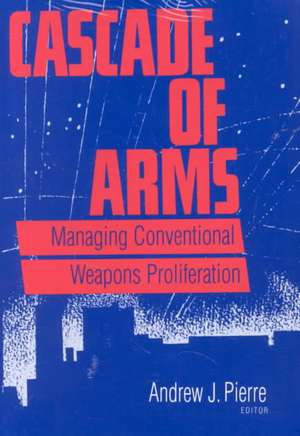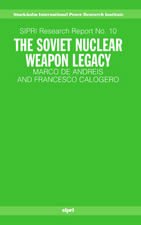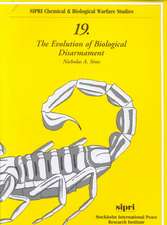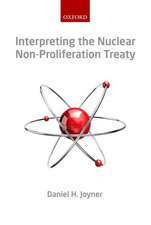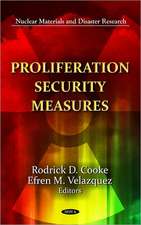Cascade of Arms: Managing Conventional Weapons Proliferation
Editat de Andrew J. Pierreen Limba Engleză Paperback – noi 1997
With the post-cold war emphasis on the proliferation of weapons of mass destruction, the neglected dimension has been the spread of advanced conventional arms. Yet these are the arms most likely to be used in conflict. They present the greatest diversion from economic and social development, and are the centerpiece of regional security balances.
This book examines the policies and practices of the major arms-supplying nations, looks at the impact of weapons purchases on the principal recipient regions and the possibilities for regional arms control, and dissects the economics of arms exports for the producer nations in both the developing and industrialized worlds. The book thoroughly discusses the opportunities for, and obstacles to, achieving multilateral restraint on arms. In addition to the editor, contributors are Ian Anthony, Stockholm International Peace Research Institute; Nicole Ball, Overseas Development Council; Julian Cooper, University of Birmingham; Lawrence Freedman and Martin Navias, King's College, London; Rodney Jones, Policy Architects International; Ethan Kapstein, University of Minnesota; Michael Klare, Five College Program in Peace and World Security Studies; Andrew Mack, Australian National University; Abdel Monem Said Aly, Center for Political and Strategic Studies, Cairo; Janne Nolan, Brookings Institution; Andrew Ross, Naval War College; Gerald Segal, International Institute for Strategic Studies; and Gerald Steinberg, Bar-Ilan University, Israel.
Copublished with the World Peace Foundation
This book examines the policies and practices of the major arms-supplying nations, looks at the impact of weapons purchases on the principal recipient regions and the possibilities for regional arms control, and dissects the economics of arms exports for the producer nations in both the developing and industrialized worlds. The book thoroughly discusses the opportunities for, and obstacles to, achieving multilateral restraint on arms. In addition to the editor, contributors are Ian Anthony, Stockholm International Peace Research Institute; Nicole Ball, Overseas Development Council; Julian Cooper, University of Birmingham; Lawrence Freedman and Martin Navias, King's College, London; Rodney Jones, Policy Architects International; Ethan Kapstein, University of Minnesota; Michael Klare, Five College Program in Peace and World Security Studies; Andrew Mack, Australian National University; Abdel Monem Said Aly, Center for Political and Strategic Studies, Cairo; Janne Nolan, Brookings Institution; Andrew Ross, Naval War College; Gerald Segal, International Institute for Strategic Studies; and Gerald Steinberg, Bar-Ilan University, Israel.
Copublished with the World Peace Foundation
Preț: 226.17 lei
Nou
Puncte Express: 339
Preț estimativ în valută:
43.29€ • 47.04$ • 36.39£
43.29€ • 47.04$ • 36.39£
Carte tipărită la comandă
Livrare economică 21 aprilie-05 mai
Preluare comenzi: 021 569.72.76
Specificații
ISBN-13: 9780815770633
ISBN-10: 0815770634
Pagini: 468
Dimensiuni: 152 x 229 x 33 mm
Greutate: 0.64 kg
Ediția:New.
Editura: Brookings Institution Press
Colecția Brookings Institution Press
Locul publicării:United States
ISBN-10: 0815770634
Pagini: 468
Dimensiuni: 152 x 229 x 33 mm
Greutate: 0.64 kg
Ediția:New.
Editura: Brookings Institution Press
Colecția Brookings Institution Press
Locul publicării:United States
Notă biografică
Andrew J. Pierre, a senior associate at the Carnegie Endowment for International Peace, is coauthor of The Algerian Crisis: Policy Options for the West (Carnegie, 1996) and author of The Global Politics of Arms Sales (Princeton, 1982), which was nominated for a Pulitzer Prize.
Descriere
With the post-cold war emphasis on the proliferation of weapons of mass destruction, the neglected dimension has been the spread of advanced conventional arms. Yet these are the arms most likely to be used in conflict. They present the greatest diversion from economic and social development, and are the centerpiece of regional security balances.
This book examines the policies and practices of the major arms-supplying nations, looks at the impact of weapons purchases on the principal recipient regions and the possibilities for regional arms control, and dissects the economics of arms exports for the producer nations in both the developing and industrialized worlds. The book thoroughly discusses the opportunities for, and obstacles to, achieving multilateral restraint on arms. In addition to the editor, contributors are Ian Anthony, Stockholm International Peace Research Institute; Nicole Ball, Overseas Development Council; Julian Cooper, University of Birmingham; Lawrence Freedman and Martin Navias, King's College, London; Rodney Jones, Policy Architects International; Ethan Kapstein, University of Minnesota; Michael Klare, Five College Program in Peace and World Security Studies; Andrew Mack, Australian National University; Abdel Monem Said Aly, Center for Political and Strategic Studies, Cairo; Janne Nolan, Brookings Institution; Andrew Ross, Naval War College; Gerald Segal, International Institute for Strategic Studies; and Gerald Steinberg, Bar-Ilan University, Israel.
Copublished with the World Peace Foundation
This book examines the policies and practices of the major arms-supplying nations, looks at the impact of weapons purchases on the principal recipient regions and the possibilities for regional arms control, and dissects the economics of arms exports for the producer nations in both the developing and industrialized worlds. The book thoroughly discusses the opportunities for, and obstacles to, achieving multilateral restraint on arms. In addition to the editor, contributors are Ian Anthony, Stockholm International Peace Research Institute; Nicole Ball, Overseas Development Council; Julian Cooper, University of Birmingham; Lawrence Freedman and Martin Navias, King's College, London; Rodney Jones, Policy Architects International; Ethan Kapstein, University of Minnesota; Michael Klare, Five College Program in Peace and World Security Studies; Andrew Mack, Australian National University; Abdel Monem Said Aly, Center for Political and Strategic Studies, Cairo; Janne Nolan, Brookings Institution; Andrew Ross, Naval War College; Gerald Segal, International Institute for Strategic Studies; and Gerald Steinberg, Bar-Ilan University, Israel.
Copublished with the World Peace Foundation
